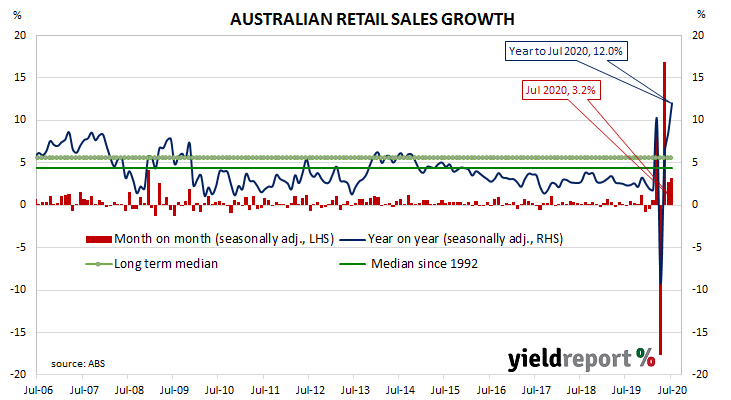Summary: Retail sales grow significantly in July; sales extend rebound from April shock; spending in all categories, especially on household goods, rises; economists expect retail growth to “soften going forward”; online sales growing strongly.
Growth figures of domestic retail sales have been declining since 2014 and they reached a low-point in September 2017 when they registered an annual growth rate of just 1.5%. They then began increasing for about a year, only to stabilise at around 3.0% to 3.5% through late 2018. A downtrend took place through 2019 and early 2020, culminating in a plunge in April as pandemic restrictions took hold. A recovery has since taken place, primarily in non-Victorian states.
According to the latest ABS figures, total retail sales increased by 3.2% in July on a seasonally-adjusted basis. The fall was basically in line with the 3.3% increase which had been expected after “flash” figures were released on 20 May and larger than June’s comparable figure of 2.7%. On an annual basis, retail sales increased by 12.0%, up from June’s comparable figure of 8.5%.
“The July retail report confirmed preliminary estimates showing sales extending on their impressive rebound from April’s COVID shock,” said Westpac senior economist Matthew Hassan. He noted “Victoria was a notable exception…”

Longer-term Commonwealth bond yields moved modestly lower, largely in line with US Treasury bond movements. By the end of the day, the 3-year ACGB yield remained unchanged at 0.30%, the 10-year yield had slipped 1bp to 0.91% while the 20-year yield finished 3bps lower at 1.46%.
In the cash futures market, expectations of any material change in the actual cash rate, currently at 0.13%, continued to remain low. By the end of the day, contracts implied the cash rate would remain in a range of 0.110% to 0.115% through to the end of 2021.
“Retail will continue to outperform most other types of household spending, but we expect to see growth soften going forward,” said ANZ economist Adelaide Timbrell.

